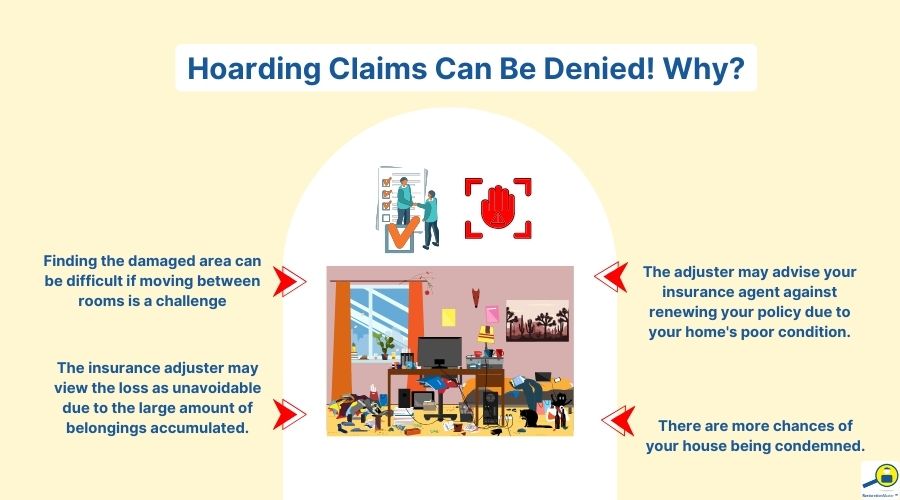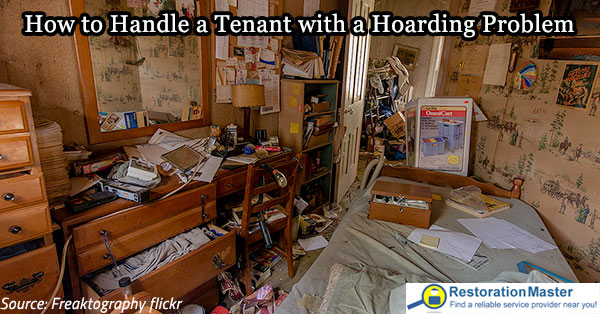How are Hoarding Claims Handled by Insurance Companies?
Does Homeowners Insurance Cover Hoarding Cleanup?
Homeowners insurance generally does not cover hoarding cleanup. While standard policies typically include provisions for sudden and accidental damage, hoarding is often seen as a long-term, preventable issue. Consequently, the costs associated with cleaning up a hoarded home, which can be substantial, are usually excluded from coverage. Hoarding can leadLead is a heavy metal that can be toxic to humans, especiall... More to structural damage, pest infestations, and increased fire risks, but because these problems develop over time, insurers view them as maintenanceMaintenance is the routine care, inspection, and repair of a... More issues that fall under the homeowner’s responsibility. Therefore, if you are dealing with a hoarding situation, it’s important to be aware that you will likely need to cover the cleanup expenses out-of-pocket.
How Hoarding Affects Your Homeowners Insurance Claim?

Homeowners insurance is designed to provide financial protection against various risks, such as damage to your property, theft, and liability for injuries that occur on your premises. However, the presence of hoarding can significantly complicate and even jeopardize your coverage.
Increased Risk and Premiums
Insurance companies assess the risk associated with insuring a property to determine the premium rates. A home affected by hoarding presents numerous hazards, including fire risks, structural damage, and increased likelihood of accidents. Clutter can obstruct pathways, block exits, and overload electrical systems, all of which heighten the potential for accidents and disasters. As a result, insurance providers may raise premiums to offset the increased risk or, in some cases, may refuse coverage altogether.
Coverage Exclusions
Policies typically include clauses that require homeowners to maintain their property in a reasonable state of repairRepair is the act of fixing or restoring damaged property, m... More and cleanliness. Hoarding can violate these terms, leading to exclusions in coverage. For instance, if a fire were to start due to an electrical malfunction exacerbated by clutter, the insurance company might deny the claim, arguing that the hoarding conditions contributed to the incidentAn incident is an event or occurrence that causes damage, di... More. Similarly, water damage claims might be rejected if the insurer determines that hoarding prevented timely maintenanceMaintenance is the routine care, inspection, and repair of a... More or repairs.
Claim Denials
In the unfortunate event of a disaster, the presence of hoarding can complicate the claims process. Insurers might conduct thorough investigations to determine the cause and extent of the damage. If hoarding is found to be a contributing factor, claims for repairs or replacements might be denied. This could leave the homeowner facing significant financial burdens without the anticipated support from their insurance policy.
Liability Issues
Hoarding not only affects the physical structureStructure refers to the framework or components of a buildin... More of the home but also poses serious liability risks. If a guest or a service worker is injured on the property due to clutter-related hazards, the homeowner could be held liable. While homeowners insurance generally provides liability coverage, the insurer might refuse to pay if the injury is directly linked to the hoarding conditions. This can result in costly legal battles and out-of-pocket expenses for the homeowner. There is also a 100% chance of your home being declared as condemned.
Remediation and Inspections
To mitigateTo mitigate is to reduce or limit the severity of damage, ri... More the risks associated with hoarding, insurance companies may require remediation efforts before issuing or renewing a policy. This could involve professional cleaning services, structural repairs, and regular inspections to ensure the home remains in compliance with policy terms. While these measures can be costly and time-consuming, they are essential for maintaining insurance coverage and ensuring the safety of the home’s occupants.
Get Help With Hoarding Cleanup

When an individual affected by the hoarding disorder has agreed to help, be sure to contact a professional service for hoarding cleanup services. It’s especially important, however, that the affected individual is on board to receive help. Professional technicians will be sensitive and show compassion to the affected individual. They develop a connection with the affected individual to build trust. Then, professionals work with them to determine what to discard to eliminate the clutter. Professionals also have the proper experience and equipment to handle hoarding cleaning in a safe, effective manner.












